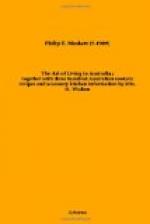then, that they grow pale and bloodless; that their
muscles turn soft and flabby; that their nervous system
becomes shattered; and that they suffer the agonies
of indigestion? Their favourite time for a chat
and the consumption of tea is at any period between
ten o’clock in the morning and three in the
afternoon. Now, if there is anything of which
I am certain, it is that tea in the middle of the day,
say from ten o’clock to three, is a deadly destructive
fluid. And I am equally certain, too, that innumerable
numbers of young girls employed in business do themselves
an irreparable amount of injury by making their mid-day
meal consist of nothing else but tea and a little bread
and butter. There is no nourishment whatever
in such fare, and it inevitably leads to the bad symptoms
already detailed and general unhealthiness, if not
to the onset of graver disease. No, they require
something which is nutritious, such as a little warm
soup of some kind, a modicum of bread, and say two
different varieties of vegetables to follow.
Of course this may be extended to include pudding,
stewed fruit, &c., but the former is ample enough
in many respects. This is a very important matter
to which the attention of proprietors and managers
of large establishments, factories, and other places
employing many female hands might well be directed.
And, moreover, if ever there was an opportunity for
an active organization to achieve really valuable
work, it would be in seeing that our city girls had
something better to eat in the middle of the day than
tea and bread and butter.
As in every other case, however, there is all the
difference in the world between the use of anything
and its abuse. It is wrong to assume that, because
a great deal of something is injurious, a small quantity
judiciously employed is equally pernicious. And
so it is even in the case of tea, for it is not to
be denied that a fragrant cup of tea is very agreeable.
As Dr. Vivian Poore most appropriately remarked in
reply to the argument that the lower animals did not
require tea, coffee, &c.: “We are not lower
animals; we have minds as well as bodies; and since
these substances have the property of enabling us to
bear our worries and fatigues, let us accept them,
make rational use of them, and be thankful.”
Of course everything hinges upon the correct interpretation
of the terms “small” quantity, and “judiciously”
employed. It may be said, however, that the drinking
of large cups of tea is never to be sanctioned under
ally circumstances whatever. It should rather
be looked upon as a delicate fluid to be imbibed only
in very small quantities. It should certainly
not be used in the middle of the day, between those
hours which I have specified; nor should it be taken
during the evening, for it almost always disturbs the
night’s rest.




